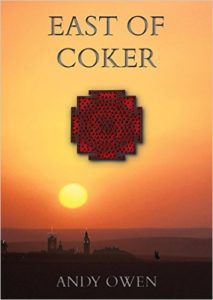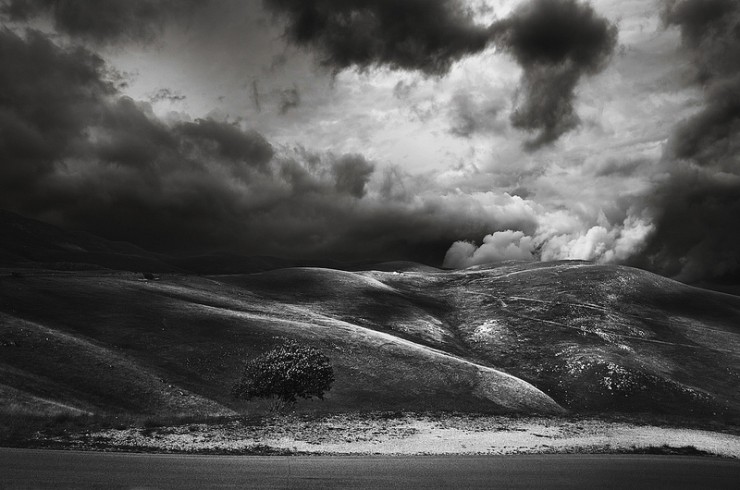East Coker is a village in Somersetshire. In 1667, Andrew Eliot emigrated from the village to the New World, specifically the American colonies. A little more than two centuries later, one of Andrew’s direct descendants was born in St. Louis, and would grow up to write poetry. He would name one of his poems “East Coker, ” for the village of his ancestors. The poem was one of four “quartets, ” originally published individually as pamphlets in England during World War II. The four would eventually be published together in America under the title of Four Quartets.
The poet, of course, is T.S. Eliot, who is more associated with what we describe as “modernism” than virtually any other poet. (Other modernist poets include Ezra Pound, William Carlos Williams, Dylan Thomas and Wallace Stevens.) Modernism has much to do with the changes that wracked Western society and culture following the Industrial Revolution, the population shift from rural to urban areas, the scientific revolution, and World War I. Context had changed; culture had changed. Society was disjointed, a kind of “waste land, ” to use Eliot’s phrase, collectively suffering what we call today “post-traumatic stress disorder (PTSD).” People had become “hollow men.”

In fictional and almost poetic form, Owen is describing what has gone by such names as shell shock and battle fatigue but we know as PTSD. It’s a medical problem known across decades and wars, and it can manifest itself in a variety of ways: reliving the trauma, nightmares, hallucinations, detachment and isolation, avoidance of what reminds one of the trauma, excessive emotions, problems relating to people including loved ones, and outbursts. There is a sense that something is broken and can’t be fixed. In the words of the old veteran in East of Coker:
“April is the cruelest month. As the dull roots are bathed with April showers, so I want to bathe every vein in different liquor, to remain numb, to avoid stirring memories buried under the snow of time. As the world wakes from winter and rejuvenation is the theme, I am reminded of what I lost, what is still missing, what is no longer a part of me. I sit on the cold bench, old dry bones aching in the leaching sunlight.”
“April is the cruelest month” is the opening line from Eliot’s The Waste Land. East of Coker is divided into six prose narratives, five bearing the title of one of the sections of The Waste Land: “The Burial of the Dead, ” “A Game of Chess, ” “The Fire Sermon, ” “Death by Water, ” and “What the Thunder Said.” Owen adds a sixth and final section: “After the Rains Came.” Each narrator—the old veteran, his lost love, the younger veteran, an Iraqi wife who hates the Allied troops and her husband for helping them, and the old veteran again—tells a story. Each illustrates the impact of both individual and societal PTSD, of how a trauma like war changes everything forever.
Owen has written one other work, Invective, which is also about war, this one the war in Afghanistan. He writes with a knowledge of war and the military so vividly, at times the reader is right next to him, experiencing the same events. And he writes with a quiet beauty that is often simply stunning.
And yet East of Coker is ultimately hopeful, that lives can be renewed. One can’t pick up from where one left, but one can start a new life, a different life. The old veteran eventually sees that, as he reaches out to the lost love decades later.
Proceeds from the sales of East of Coker are given to the Shoulder-to-Shoulder Project in the U.K., which helps veterans and their families. Currently there are Shoulder-to-Shoulder Projects in London, Birmingham, and Scotland.
East of Coker is an extraordinarily fine way of using the poetry of T.S. Eliot in a way that I believe Eliot meant it to be understood. It is a worthy fundraising project. And a very moving narrative.
Photo by Daniele Zedda, Creative Commons, via Flickr. Post by Glynn Young, author of the novels Dancing Priest and A Light Shining, and Poetry at Work.
__________________________

“I require all our incoming poetry students—in the MFA I direct—to buy and read this book.”
—Jeanetta Calhoun Mish
- Poets and Poems: Donna Vorreyer and “Unrivered” - October 7, 2025
- Poet Sidney Lanier and the Lost Cause - October 2, 2025
- Poets and Poems: A.J. Thibault and “We Lack a Word” - September 30, 2025


Shira Garnett says
Glynn, you are a exceptionally, well rounded writer! God bless the works of thy hands.
Glynn says
Shira – thank you for reading the post, and for the comment!
Sandra Heska King says
Hi, Shira. I’m just taking some cherry scones out of the Mischief Cafe oven. Can I offer you one along with a cup of tea. 🙂
Maureen says
What a great way to benefit a project that can help save lives!
Glynn says
It is a great project – and it’s a wonderful read. Thanks for the comment!
Bethany says
Thank you for this post. What an important cause and unique way of helping. The excerpt you shared from East of Coker is so real and painfully beautiful.
Glynn says
Thanks, Bethany. The entire book is like that.
Sandra Heska King says
This has given me new insight into Eliot’s Four Quartets. Now I need to go back and read them again… and then this. My bookshelves are groaning under the weight…
CR Mittal says
A very fine review.